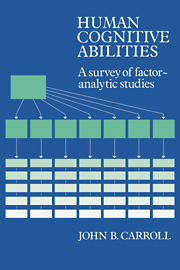Book contents
- Frontmatter
- Contents
- Preface
- PART I INTRODUCTION TO THE SURVEY
- PART II THE IDENTIFICATION AND DESCRIPTION OF COGNITIVE ABILITIES
- Chapter 5 Abilities in the Domain of Language
- Chapter 6 Abilities in the Domain of Reasoning
- Chapter 7 Abilities in the Domain of Memory and Learning
- Chapter 8 Abilities in the Domain of Visual Perception
- Chapter 9 Abilities in the Domain of Auditory Reception
- Chapter 10 Abilities in the Domain of Idea Production
- Chapter 11 Abilities in the Domain of Cognitive Speed
- Chapter 12 Abilities in the Domain of Knowledge and Achievement
- Chapter 13 Psychomotor Abilities
- Chapter 14 Miscellaneous Domains of Ability and Personal Characteristics
- Chapter 15 Higher-Order Factors of Cognitive Ability
- PART III ISSUES
- References and List of Datasets
- Appendix A Codes for Countries, Samples, and Factors
- Appendix B Hierarchical Factor Matrix Files
- Name Index
- Subject Index
Chapter 9 - Abilities in the Domain of Auditory Reception
Published online by Cambridge University Press: 29 September 2009
- Frontmatter
- Contents
- Preface
- PART I INTRODUCTION TO THE SURVEY
- PART II THE IDENTIFICATION AND DESCRIPTION OF COGNITIVE ABILITIES
- Chapter 5 Abilities in the Domain of Language
- Chapter 6 Abilities in the Domain of Reasoning
- Chapter 7 Abilities in the Domain of Memory and Learning
- Chapter 8 Abilities in the Domain of Visual Perception
- Chapter 9 Abilities in the Domain of Auditory Reception
- Chapter 10 Abilities in the Domain of Idea Production
- Chapter 11 Abilities in the Domain of Cognitive Speed
- Chapter 12 Abilities in the Domain of Knowledge and Achievement
- Chapter 13 Psychomotor Abilities
- Chapter 14 Miscellaneous Domains of Ability and Personal Characteristics
- Chapter 15 Higher-Order Factors of Cognitive Ability
- PART III ISSUES
- References and List of Datasets
- Appendix A Codes for Countries, Samples, and Factors
- Appendix B Hierarchical Factor Matrix Files
- Name Index
- Subject Index
Summary
…if there are marked individual differences in the predispositions of individuals to appreciate various aspects of rhythm, pitch, melody, harmony, and timbre, then a fuller understanding of these differences should be relevant to music education.
Roger Shepard (1981, p. 154)It is difficult to define the domain of auditory receptive abilities in such a way that it properly excludes many abilities that in some way involve auditory reception, but that are not strictly auditory abilities, for example, speech comprehension ability or musical appreciation. Roughly, for this category I have in mind any ability that depends mainly on the characteristics of the auditory stimulus itself and the individual's capacity to apprehend, recognize, discriminate, or even ignore those characteristics, independent of the individual's knowledge of structures in language or in music, for example, that determine the overall pattern of an extended auditory signal. Speech comprehension ability, for example, would be regarded as an auditory receptive ability only when the auditory signal is distorted or attenuated in special ways that interfere with normal speech comprehension; in most contexts speech comprehension ability depends mainly on knowledge of a language and only secondarily on auditory ability. Similarly, music appreciation ability (if it exists and can be measured) would be regarded as an auditory receptive ability only to the extent that it might depend on the individual's capacity to perceive and discriminate those features of a musical auditory signal that make its appreciation possible.
- Type
- Chapter
- Information
- Human Cognitive AbilitiesA Survey of Factor-Analytic Studies, pp. 364 - 393Publisher: Cambridge University PressPrint publication year: 1993



